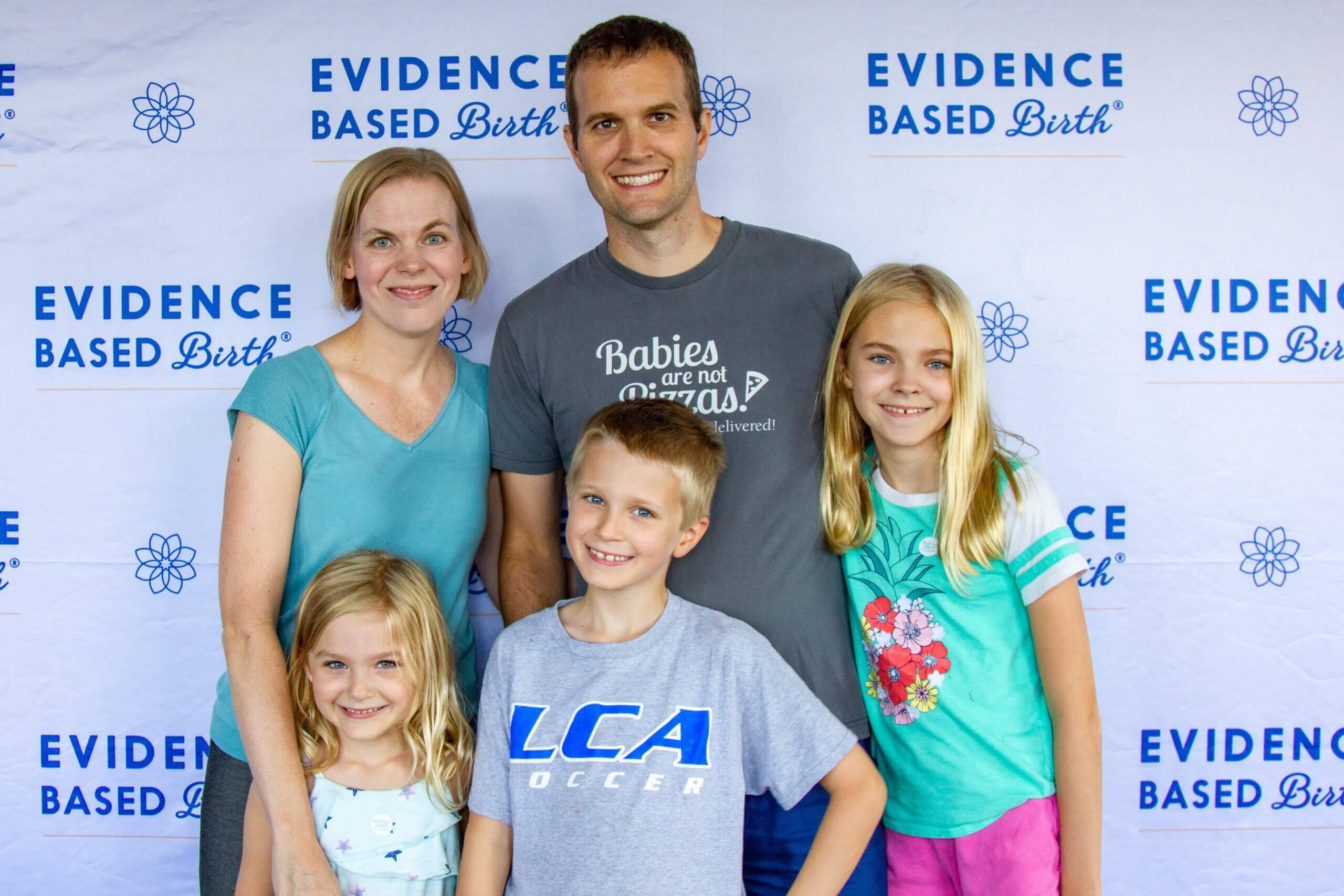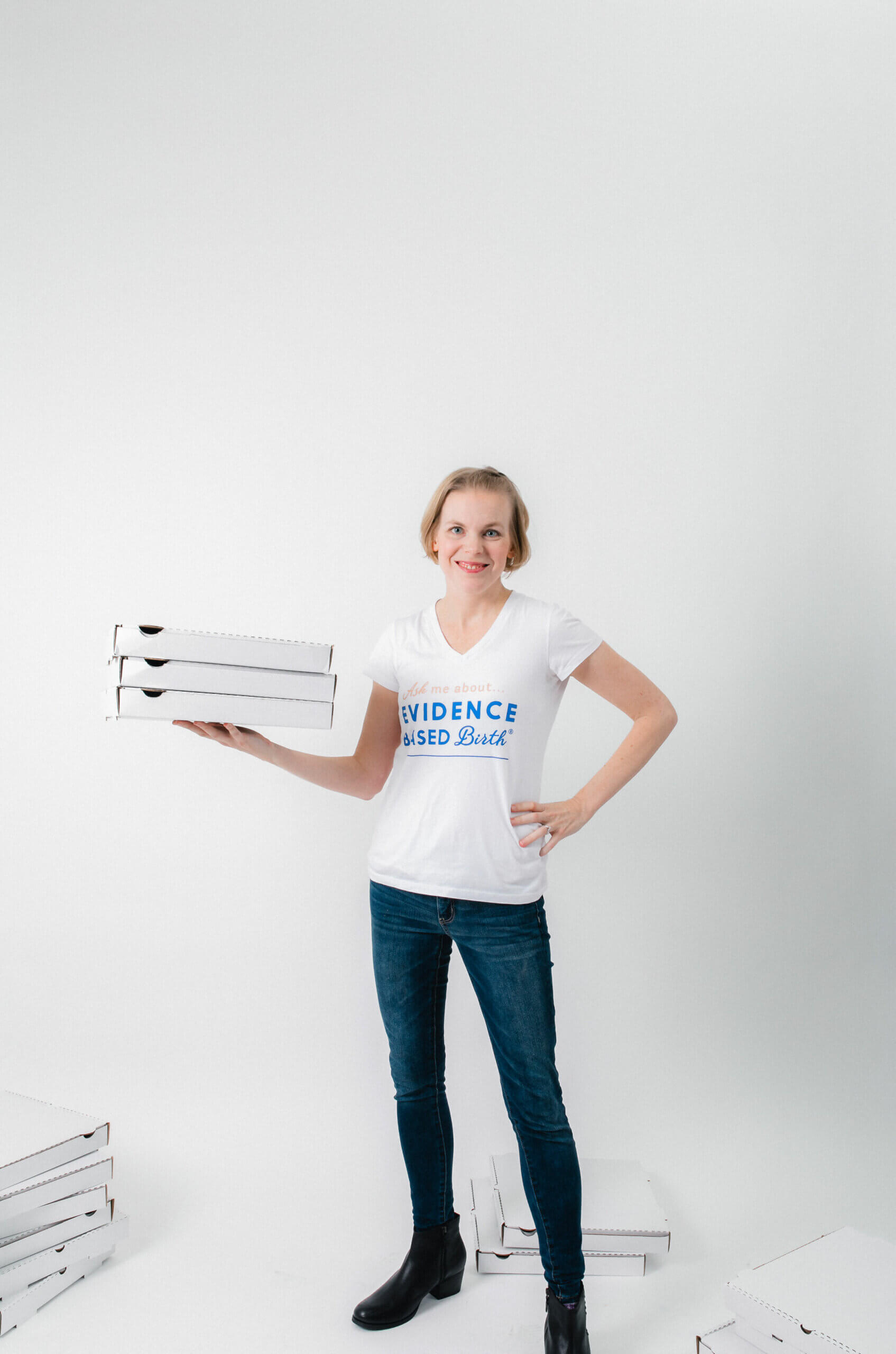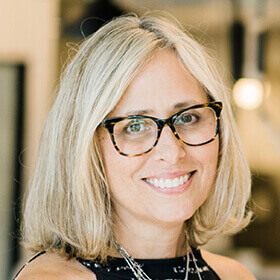Rebecca Dekker never planned to create her own business. Her business found her anyway.
In March 2012, while on maternity leave after her second baby was born, Rebecca was asked to speak about her birth experience to a group of resident physicians training to become family doctors. After a traumatic hospital birth with her first child, she’d had a home birth with number two.
Before the talk, the residents’ faculty advisor asked Rebecca if she could share any research to support the residents in their practice. So Rebecca sat down and typed up the research on a handful of common labor and delivery practices, created one-page handouts on each topic, and passed out copies at her talk.
The residents loved the handouts, and asked for more. Rebecca was invigorated. She also wondered if anyone was doing something similar online—taking the research on childbirth, summarizing it, and making it understandable. She envisioned a clearing house where people could find anything they wanted to know on the topic of childbirth.
“I Googled it, and there was nothing.”
Even Wikipedia was “really bad,” says Rebecca. “The articles on childbirth were pretty low quality. And the original research was basically inaccessible to the average consumer, at a cost of $30 or $40 per paper.”
“It basically meant that all of the world’s research was behind a paywall,” says Rebecca. “And if you were a parent who was really interested in research information, you couldn’t get it, and even if you could get it, you often didn’t understand it.”
Thankfully, Rebecca had a PhD, and deconstructing clinical research was her area of expertise. “It just made sense that I would create that thing.”
She told her husband, Dan, she was starting a blog, picked the domain name, created a WordPress site, and started posting.
At first, says Rebecca, “I was kind of nervous about it, so I didn’t even tell anybody.”
But after three or four posts, she finally shared the blog with friends and family on Facebook. Gradually, they started telling others—and then “it just went viral.”
Blog traffic was doubling each month, and people started giving Rebecca suggestions for what to write about next.
“From the very beginning, it was a very interactive experience because I was trying to learn this research. I was approaching it from a really open mind—I’m curious, I want to learn.”
Rebecca started running with the ideas her audience was feeding her. After reviewing the literature on a topic, she’d write up a summary with references and post the article for free on her blog.
“People loved it because nobody else had ever done that before with birth.”
From a Blog to a Business
At the same time, Rebecca noticed a larger trend of people wanting more agency over their health and medical care. “They were hungry for knowledge. And the same thing was happening in childbirth.”
Within a year, the blog was getting so much traffic that it started crashing. Rebecca saw that she needed to do “something to make it sustainable” and start generating income so the website could at least pay for itself. Working full-time with two little kids, her time was pretty valuable, too.
She hadn’t intended to create a business with her blog, but with her traffic and audience growing, she needed a plan. Dan has an MBA and had always wanted to start a business himself, but the two of them “had never been able to think of an idea” for one—”and a lot of what I needed to learn in order to run an online business was not taught in his programs.”
Thankfully, Rebecca is a self-described lifelong learner, so she dove in, checking out books from the library and looking up online business–focused podcasts.
In 2013, she found the SPI Podcast. Through Pat’s episodes—as well as some of the people Pat interviews on the show—Rebecca was able to “figure out the basics of how to build a business.”
“I just started at the very beginning, listening to every episode and giving myself an education in business. It felt like I was getting a free MBA from listening to him.”

Armed with this new knowledge, she launched her first online class that fall, on a topic her audience had selected: “big” babies. “It’s actually quite rare to have a baby that’s too big to birth, but it’s a common fear in our culture,” says Rebecca.
Within the first couple of hours post-launch, she’d more than recouped her expenses—namely, a nice microphone, Camtasia screen-recording software, and the application fee to become an approved provider of nursing continuing education.
“I was just blown away by the response. But the reason I was able to sell so many tickets, of course, was because I’d already built an email list that summer.”
Flashback to 2012. Rebecca had been steadily building an audience on Facebook, in the era before the Facebook algorithm decided what people saw when they logged in and scrolled their feeds. As a result, Rebecca’s audience grew really quickly. But when the algorithm was implemented, all of a sudden it became much more difficult to be seen on the platform. The organic reach of Rebecca’s posts withered, and her audience growth “tanked.”
I have no way to communicate with these people, she thought. She realized she had to start an email list.
Rebecca jump-started her list by creating a lead magnet—a ten-page research article she created on American obstetrics in the 1950s—and within a week, 1,500 people had downloaded it.
Making the Leap
Early on, Rebecca saw the potential for her growing business, Evidence Based Birth®, to become her main focus. “I’m just putting a very small amount of my time into this, and it’s already grown like crazy,” she recalls thinking.
“What if I could do this full time?”
She was also inspired to make more of a difference in the maternity care system. But she had studied for years to become a professor, and she was on the tenure track with several grants. “I had been building this career in academia and I thought, I can’t leave that. Like, how do you give up that job? It’s so prestigious. It’s well-paying. It’s health insurance. It’s working with students, which I love. And I was doing research and I loved my research team.”
But in the fall of 2015, Rebecca experienced her “cliff’s edge moment,” an encounter with a superior that made her question her academic freedom and her ability to speak her mind on her blog. Although she was on track for tenure, she was still a few years away from it. She was also unhappy with the unsafe care she saw being provided to women giving birth at the hospital affiliated with her university.
“I felt like ethically, even though I loved my university, I love my coworkers, I love my job—eventually I realized I cannot work for this institution anymore, so I had to figure out an escape route.”
Forced to leap, Rebecca started crunching numbers and brainstorming a way out of her current track. The option she came up with was a membership program for Evidence Based Birth that would provide stable, recurring revenue and let her cut the cord.
At the time, Dan was a stay-at-home dad. They both knew that if Rebecca left her job they’d be all in with Evidence Based Birth.
It was go-time. They launched the membership in fall 2015, and locked down 125 members in the first week. It was an amazing start—but not enough to justify quitting her 9-to-5.
So a few months later, Rebecca and Dan sat down and calculated how many members it would take to cover 80 percent of her salary: just 100 more. In January 2016 they relaunched, and got their hundred members. Rebecca gave her notice in February, worked through June, and on July 1, “was free officially.”
Smooth sailing from there, right? Actually, says Rebecca, “It was pretty scary. Even though I knew things would probably be okay, it was still like jumping off a really tall diving board. We didn’t have health insurance, retirement, dental benefits—all those things you get when you’re employed, just vanished. And I couldn’t sleep the first couple of months.”
Thankfully, Rebecca also started feeling the benefits of the change right away. “Like the fact that I was home every day with my husband and all my kids and I wasn’t commuting to work.” She did feel sad—and a little guilty—about leaving behind her coworkers. “I felt like I was letting a lot of people down by leaving.”
“But in the end, they were all just happy for me.”
Now, the membership program that let Rebecca leave her day job has become a core element of the business. Members pay either monthly or annually for access to the entire library of one-pagers or “print-friendly PDFs” that they’ve created over the past few years. They also get access to a wider community via a website forum and private Facebook group with roughly 1,300 professionals from around the world, as well as monthly trainings.
The Impact of COVID-19
The COVID-19 pandemic in 2020 upended many aspects of our lives, and added another layer of concern to the experience of bringing new life into the world. To help address growing anxiety among expectant mothers in the “new normal,” Rebecca and her team started sending a weekly COVID-19 pregnancy email research update since the beginning of the pandemic in March 2020.
“From the very beginning that’s been my focus: how can I serve my audience? And obviously, I modeled that from Pat as well. He’s always asking, how can I serve?”
Rebecca says the weekly emails have been a great way to serve the Evidence Based Birth community in a difficult time—and as of mid-May 2020 the emails had helped grow the email list by another 12,000 subscribers. “It’s this great mutual relationship where the more we serve and provide people with what they need, the more people are drawn to what we’re doing.”
One COVID-related issue her team has been monitoring and reporting on via the weekly emails is how the pandemic has highlighted and exacerbated existing structural inequities. “One of the problems we have in this country is that Black women die at a three to four times higher rate during pregnancy and childbirth and postpartum because they’re discriminated against,” says Rebecca, “and that’s happening even more so during the pandemic. There’ve been several publicized maternal deaths of Black mothers dying from COVID-19, or from not being treated appropriately even though they didn’t have COVID-19.”
The pandemic also made things a lot busier for the team, at least early on. In addition to starting the weekly emails, the team spent the first month of the outbreak converting their in-person and partially online birthing classes to 100 percent online. The upside is that now someone can take an Evidence Based Birth class from anywhere in the world.
“We’re reaching more people with our childbirth education than ever,” Rebecca says.
Her First Book
When one of Rebecca’s early employees suggested she write a book, Rebecca realized how it could be a great tool to grow her audience and help more people understand why “the system is so screwed up and what we can do to fix it.”
“One of the reasons I wrote the book is I really wanted to create change.” Despite the work she’d done so far, many hospitals and doctors still hadn’t changed their outdated or harmful practices. “And so even if a parent comes and reads all the articles for free on my website, they could still show up and be traumatized by the outdated care they receive.”

In 2017, Rebecca started writing, leaning heavily on Pat’s guidance on book writing. She also hired Azul Terronez, the book coach who was instrumental in helping Pat write Will It Fly?.
After the first draft was done, Rebecca shared the book with a few reviewers. But one of her readers’ feedback was like a splash of cold water to the face. “Rebecca,” she said, “this is not the book. It doesn’t speak to me.” The crux of the complaint was that the book revolved around science and case studies, and not Rebecca’s compelling personal birth stories. The reviewer encouraged Rebecca to recenter the book’s narrative around her own experience instead.
So Rebecca deleted a big chunk of the book and started over. “It was a pain, but I did it.” In 2019 she finished the book and self-published it with Azul’s help. She also hired an audio engineer to create an Audible version that she read herself.
At the end of the book, Rebecca inserted a note asking people to email her about their experience reading it. “I’ve gotten the most amazing emails from around the world of people who have been impacted by the story. And a lot of them are people inside the healthcare system.”
The book, called Babies Are Not Pizzas: They’re Born, Not Delivered, has been doing “pretty well” on Amazon and provides a nice chunk of passive income for the business. Although it cost more upfront to self-publish, Rebecca and her team get to keep more of the proceeds than if they’d found a traditional publisher. “The cool thing is that the book will support our business for many years to come,” says Rebecca. “As Azul so eloquently talks about, books have ‘long legs’—they last a long time.””
Rebecca has an outline and the start of the first chapter of a second book in the works, slated for publication in 2022.
Getting Lucky but Always Learning
As an online business owner, Rebecca knows that the process of learning and growing is nonstop. In terms of training opportunities, she’s moved beyond the entry level, and focuses mostly on advanced one-on-one or small-group options.
“A lot of the trainings for online business owners don’t necessarily apply to me because I already have a podcast, I already have a membership, I already do profit-first accounting, I already published a book . . . so the kind of professional development I need now is more one-on-one coaching.”
In addition to joining a mastermind group with some other bloggers, she’s a member of Shane and Jocelyn Sams’ Flip Your Life coaching program and has worked with Natalie Eckdahl of BizChix. She also listens to a few podcasts to learn new things and keep her business skills sharp (like SPI!), but she’s careful to limit her intake.
“There’s an endless flow of knowledge you could be gaining about online business. And I’ve learned it’s helpful to stick to a need-to-know basis. If I need to learn something, I go learn it. I don’t just listen for the sake of the thing.”
Rebecca’s drive to keep learning and improving coexists with the realization that she was lucky to build a successful business with Evidence Based Birth almost right away—“like hitting a home run on the first try,” something she knows is uncommon in the online business world.
“Most of my friends who are online entrepreneurs now had to go through several iterations before they found the right online business. I think most people in online business have to pivot several times before they find the correct niche for them.”
Rebecca also says she doesn’t think online business is for everyone. “It takes a lot of dedication, hard work, and perseverance. And what I’ve found is a lot of people, they may work hard, they may be dedicated, but at the end of the day, they get sick of it and they give up or they get discouraged.”
So what can a would-be online entrepreneur do to maximize their chances of success? Here are three of Rebecca’s best pieces of advice.
#1: Have Passion
“It has to be something you’re super passionate about. If you can’t stop thinking about it or writing about it or talking about it, that’s a good sign. One of the only reasons I was successful in this is because I was obsessed with the research on childbirth for years. I’m still at the point where I would like to spend my Friday nights reading research studies about these topics. If you’re not motivated to pursue a topic or niche, you’re going to, after a couple months, get bored and move on. So for me it was finding that deep personal connection with what I wanted to do.”
#2: Solve People’s Problems
“Is there a problem that needs solving? Are people looking for answers for something that’s really bothering them? In my case, it was pretty clear: childbirth care in many hospitals is about twenty to thirty years outdated. So there’s a big problem there that needs solving, and it’s something I was passionate about.”
#3: Produce Great Content
“Like they say, content is king. Creating content that people want to share and tell all their friends about is probably the most valuable thing you can do. And that’s how I got my start, creating really valuable content and giving it away for free, on a topic that people want solving, and on something that I couldn’t stop thinking about.”
About Rebecca
Rebecca Dekker and her husband, Dan, live in Lexington, Kentucky, with their three children, aged 6, 8, and 11. Rebecca is a registered nurse by training. She went to grad school at a young age and worked as an assistant nursing professor for about six years before leaving academia to work on her online business full time.
Rebecca is the author of the best-selling book Babies Are Not Pizzas: They’re Born, Not Delivered, and CEO of Evidence Based Birth®, which has ten team members, including: a graphic designer, audio video editor, instructor-program director, membership coordinator, communications director, research editor, personal assistant, and a CFO (who also happens to be Dan).
 Karen Beattie
Karen Beattie


